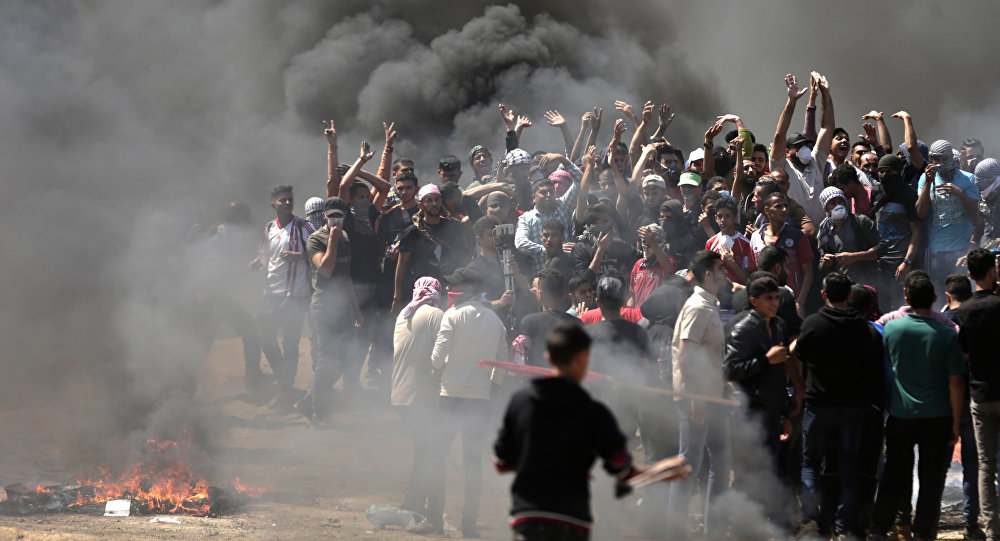- Dozens Dead as Gaza Erupts Over U.S. Embassy Move to Jerusalem
Israeli forces shot dead 41 Palestinians as tens of thousands converged on Gaza’s border in the worst single day of violence there since a 2014 war, casting a pall over President Donald Trump’s contentious inauguration of a U.S. embassy in Jerusalem.
Hundreds more were wounded by live fire, the Health Ministry in Hamas-run Gaza reported. Tens of thousands joined demonstrations in the hours leading up to the inauguration ceremony to be attended by Trump’s daughter and son-in-law.
The U.S. policy shift was a diplomatic victory for Israeli officials, but a blow to the Palestinians, who see it as undermining their claim to establish a capital in the city’s eastern sector and have been carrying out a campaign of protests against Israel in recent weeks. Gaza protesters, egged on by loudspeakers and transported in buses, streamed to the border, where some threw rocks, burned tires, and flew kites and balloons outfitted with firebombs into Israeli territory.
The Israeli military, which has airdropped leaflets warning protesters to stay away from the frontier, said it stopped militants from laying an explosive device along the frontier. Aircraft targeted Hamas security posts after troops were fired upon, it added.
Israel accuses Hamas of using the protests as cover to attack the Jewish state, and has vowed to prevent any attempts to breach the border, the ultimate objective of the protest campaign. It also charged Iran of funding the violence against Israel along the border.
Palestinian Displacement
The “March of Return,” as the weeks-long protest is known, began as an effort by grassroots groups to draw attention to the Palestinians’ demand to return to homes lost in fighting surrounding Israel’s 1948 creation. The campaign, which took shape after the embassy transfer was announced, was quickly co-opted by Hamas, eager to divert popular anger away from its management of impoverished Gaza.
Border confrontations are expected to spill into Tuesday, when Palestinians mark the 70th anniversary of the “nakba,” or “catastrophe,” of their displacement by Israel’s birth.
As the violence unfolded in Gaza, Israeli officials prepared to celebrate the transfer of the embassy to Jerusalem, a move Trump’s predecessors and most other countries have shunned to avoid taking sides in the contest over sovereignty.
‘Security Priority’
Trump, who vowed to move the embassy from Tel Aviv during his campaign, is to address invitees to the designation ceremony via video conference. Ivanka Trump and her husband Jared Kushner are among a U.S. delegation that includes Treasury Secretary Steven Mnuchin and deputy Secretary of State John Sullivan.
“Many presidents signed a waiver for national security reasons not to move the embassy,” Mnuchin said at a reception hosted by an Orthodox Jewish group Monday morning. “President Trump is moving the embassy because it’s a national security priority to have the embassy here in Jerusalem.”
When Trump declared Dec. 6 that “it is time to officially recognize Jerusalem as the capital of Israel,” he said it wouldn’t prejudge the contested city’s final status, and that he hoped the move would spur the renewal of peace negotiations. Instead, the decision angered much of the Middle East, including U.S. allies, and Palestinian Authority President Mahmoud Abbas responded by breaking off all contact with the Trump administration.
“As the Palestinian people continue to endure 70 years of ongoing Nakba, ethnic cleansing and exile, as well as over 50 years of occupation, the U.S. administration has chosen to celebrate it by moving its embassy from Tel Aviv to Jerusalem,” Saeb Erekat, secretary general of the Palestine Liberation Organization, said in a statement Monday. “This infamous hostile act against international law and against the people of Palestine places the U.S. on the side of the occupying power, Israel.”

Clashes Erupt as Palestinians Rally Against US Embassy Move in Jerusalem
Israeli police beefed up their presence around the city, with 1,000 officers tasked with providing security for the embassy opening, spokesman Micky Rosenfeld said. Forces include anti-terrorism units, undercover officers and paramilitary border police, with special attention being paid to Arab neighborhoods near the embassy site, he said.
Broken Promises
Before Trump, U.S. presidential candidates for decades had vowed they’d move the embassy, but postponed the move out of concern it would disrupt peace prospects. Moving the embassy is a requirement of a 1990s U.S. law that was regularly waived by Trump’s predecessors going back to Bill Clinton.
The Trump administration bypassed years of construction on a new embassy by repurposing an existing consular building for the time being. Since the compound isn’t large enough to host all the staff currently based in Tel Aviv, officials will commute back and forth.
The opening comes amid heightened tensions across the region. Israeli forces have stepped up attacks on Iranian targets in neighboring Syria over the past week, after saying Tehran-backed troops targeted Israel with a missile barrage. Iranian officials rejected that accusation and are fuming over Trump’s decision to withdraw from the 2015 nuclear deal with Iran and five other world powers.